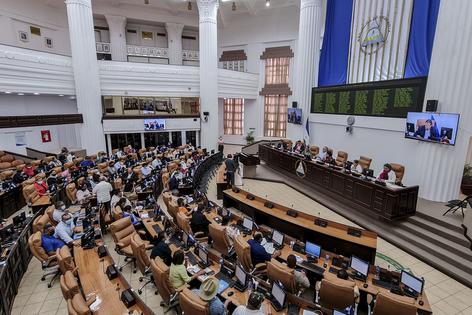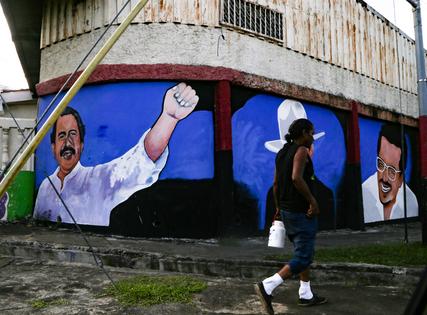Nicaragua has kicked out hundreds of NGOs – even cracking down on Catholic groups like nuns from Mother Teresa's order
Published in Political News
Many countries around the world are becoming less democratic as leaders in places such as Nicaragua, Mali, Hungary and Bangladesh seek to increase their power and diminish the ability of the courts, legislatures and independent institutions to constrain them.
It’s a process that scholars in political science refer to as “democratic backsliding” or “democratic erosion.” We’ve been studying this situation in Nicaragua, and we see it as emblematic of the global trend.
Unlike the regime changes of the 20th century, in which dictatorships sprang up overnight after violent revolutions and military coups, today’s autocrats more subtly and gradually undermine the foundations of democracy. They rig the rules in their favor by weakening checks and balances in their nations and by engaging in manipulation that keeps them in power.
One method that today’s autocrats and the governments under their control are increasingly using to strengthen their grip on power is to crack down on nongovernmental organizations. They are branding these often foreign-funded groups, known as NGOs, as foreign agents. Another tactic is to cast them – usually falsely – as money launderers and terrorists.
All of these designations undermine the NGOs’ credibility and create a pretext for restricting their operations.
It’s true that many powerful governments like the United States fund NGOs. Typically, this money pays for clearly beneficial work such as building roads, wells and schools or increasing access to health care.
Globally funded independent organizations, like the Red Cross, also fill these gaps and often rush in supplies and support after disasters strike.
However, many NGOs focus on assistance that buttresses democracy, by encouraging voting and other forms of civic engagement. And because of those efforts, they have become subjected to tight government supervision and auditing.
This is especially happening in countries that are undergoing democratic backsliding, such as Poland and India.
Democratic backsliding is well underway in Nicaragua under President Daniel Ortega’s increasingly authoritarian leadership. Especially in 2022, his government has been clamping down on NGOs and Catholic institutions.
Ortega first rose to power in 1979. He stepped down from the presidency after losing a closely monitored election in 1990, only to become president again after a 2006 win. He has since been reelected three times, most recently in 2021.
This phase of his leadership has been rocked by waves of domestic turmoil and repression.
One of the most troubling moments came in 2018, when the authorities attacked people who were taking part in widespread protests over proposed safety-net reforms.
Estimates from outside observers indicated that over 350 people were killed by the Nicaraguan police force, with thousands more imprisoned.
Nicaragua has since cracked down harshly on NGOs operating there, prohibiting more than 1,600 of them so far.
A series of legislative decrees passed by the National Assembly, over which Ortega wields much influence, have stripped these organizations’ rights to exist and operate in the Central American country. This status is known there as “legal personhood.”
The most far-reaching of these decrees were issued in 2022, sometimes with 100 NGOs or more losing their rights at one time. For example, decrees number 8823 through 8827, passed between July and August, removed legal recognition from 100 organizations at a time, for a total of 500.
Meanwhile, lawmakers have issued a large number of decrees in 2018 and 2019 granting recognition to domestic NGOs. The largely religious and community-based organizations may have been encouraged to carry on the operations of NGOs that were being pushed out of Nicaragua. We have been unable to learn much about how these new groups are faring so far.
Throughout 2019 and 2020, several outspoken NGOs were forced to stop operating by legislative decrees, resulting in the seizure of their assets and often the imprisonment or expulsion of their leadership. This was accompanied by legislation that included the Foreign Agents Law passed in October 2020, which mirrored word for word language used by Russia and other backsliding countries.
Nicaragua then picked up the pace of its NGO closures, including the expulsion of human rights groups and development agencies, as well as health care organizations. Even some Catholic institutions have been sent packing, with nuns from the order founded by Mother Teresa leaving the country on foot.
Nicaragua has also expelled the apostolic nuncio – who serves essentially as an ambassador of the Catholic Church – in a move the Vatican called “incomprehensible.”
Among countries recently experiencing democratic backsliding, not all have such an adversarial relationship with major religious organizations. In Hungary, for example, Viktor Orbán has considerable support from Evangelical Christians.
However, in Nicaragua, Ortega has cast a wide net in clamping down on civil society, as demonstrated by the legislation used to restrict the ability of NGOs and other organizations to operate freely. This is part of a broader effort to weaken the electorate’s ability to prevent his further consolidation of power.
This article is republished from The Conversation, an independent nonprofit news site dedicated to sharing ideas from academic experts. It was written by: Kelsey Martin-Morales, University of South Carolina and Matthew Wilson, University of South Carolina. If you found it interesting, you could subscribe to our weekly newsletter.
Read more:
Support for democracy is waning across the Americas
One year after Nicaraguan uprising, Ortega is back in control
The authors do not work for, consult, own shares in or receive funding from any company or organization that would benefit from this article, and have disclosed no relevant affiliations beyond their academic appointment.


























































Comments